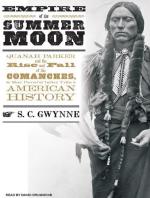|
This section contains 608 words (approx. 2 pages at 400 words per page) |

|
"She was the best known of all the Indian captives of the era, discussed in drawing rooms in New York and London as the 'white squaw' because she had refused on repeated occasions to return to her people, thus challenging one of the most fundamental of the Eurocentric assumptions about Indian ways: that given the choice between sophisticated, industrialized, Christian culture of Europe and the savage, bloody, and morally backward ways of the Indians, no sane person would ever choose the latter." (Chapter 1, p. 8).
"His mother's family offers a nearly perfect example of the sort of righteous, hard-nosed, up-country folk who lived in dirt-floored, mud-chinked cabins, played ancient tunes on the fiddle, took their Kentucky rifles with them into the fields, and dragged the rest of American civilization westward along with them." (Chapter 2, p. 21).
"Most of the disposed Indians took their ragged, starving families and headed north to...
|
This section contains 608 words (approx. 2 pages at 400 words per page) |

|




